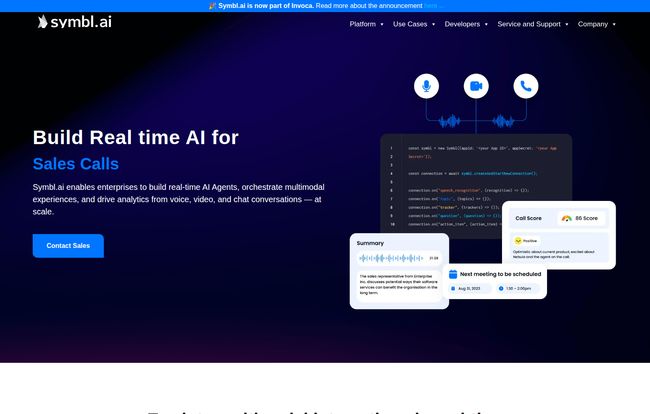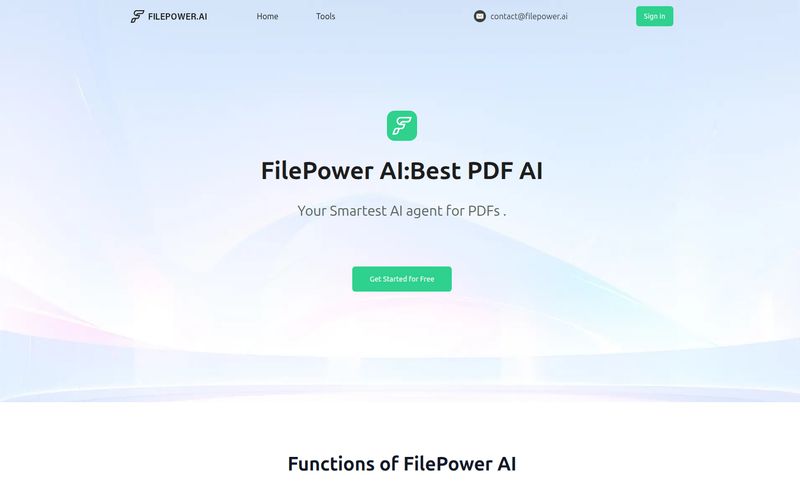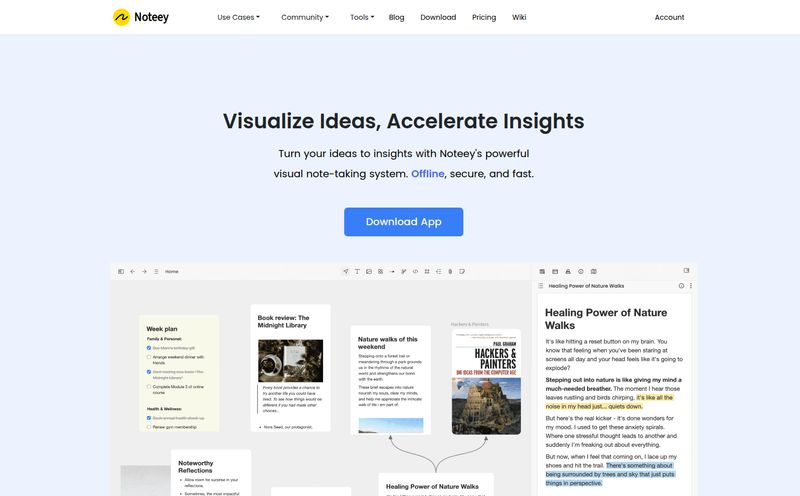For years, we’ve been swimming in data. Website clicks, conversion rates, heatmaps... we track it all. But there’s always been this giant black box right in the middle of our businesses: human conversation. Sales calls, support chats, team meetings. It's a goldmine of information that, until recently, has been almost impossible to analyze at scale. We record calls, sure. Maybe we even get them transcribed. But who has the time to listen to thousands of hours of audio to find the real insights?
I've been in the SEO and traffic game for a long time, and I've seen countless tools promise to revolutionize how we understand our customers. Most are just prettier dashboards for the same old data. But every now and then, something comes along that makes you lean in a little closer. For me, right now, that's Symbl.ai. It’s not just another transcription service. It claims to be a conversation intelligence platform. A big claim. So, I decided to pop the hood and see if the engine actually matches the slick paint job.
So, What is Symbl.ai, Really?
Okay, cutting through the marketing jargon, Symbl.ai is an API-first platform designed for developers to build applications that can understand human conversations in real-time. Think of it less as a finished car and more like a high-performance engine and chassis. You or your dev team are the ones who build the car around it, tailored perfectly to your needs.
It goes way beyond simple speech-to-text. That's table stakes these days. The real magic, or at least the promised magic, is in its ability to understand context, track topics, gauge sentiment, and pull out actionable items from a free-flowing conversation. It’s designed to process voice, video, and text, and then hand you back structured, meaningful data. It’s like having a hyper-observant, multilingual assistant who takes flawless notes on every single interaction your company has.

Visit Symbl.ai
The Features That Actually Move the Needle
A feature list can be boring, so let’s talk about what this stuff actually does for a business. I've seen a million feature lists, but only a few truly matter when the rubber meets the road.
It Hears and It Understands
At its core, you have Real-time Speech-to-Text and Live Captioning. This is foundational. But where Symbl.ai gets interesting is with its Contextual Understanding. It doesn’t just hear words; it tries to grasp the situation. It can identify questions, action items (like “I’ll send you the report by Friday”), and follow-ups. This is huge. It’s the difference between a raw transcript and meeting minutes that actually make sense.
Finding the Signal in the Noise
This is where things get really cool for product and revenue teams. Features like Sentiment Analysis and User Intent Tracking are about reading the room, digitally. Is the customer getting frustrated? Are they showing strong buying signals? Symbl.ai aims to flag these moments. It also offers Call Scoring and Compliance Monitoring. This automates the incredibly tedious process of QA'ing support and sales calls. Instead of a manager spot-checking 5% of calls, you can have AI audit 100% of them against your custom criteria, flagging calls that need a human review. That's a massive efficiency gain.
Making Data-Driven Feedback a Reality
Finally, it’s all tied together with things like Summary Generation. After a 45-minute call, the platform can generate a concise summary. For anyone in account management, this is a dream. It means less time on tedious data entry and more time building relationships. This is what's meant by data-driven feedback. You're not just telling a sales rep, “You need to do better.” You can show them, “In 70% of your calls this week, customer sentiment dropped when you discussed pricing. Let’s work on that.”
Who Is This Really Built For?
The website says it’s for AI Teams, Product Teams, Revenue Teams, and Data Teams. And that’s true. But the big, bold text on their homepage says it all: "By Developers, For Developers."
This is not a plug-and-play tool for a marketing manager with no tech support. This is a platform for companies that have developers ready to integrate an API. If you're a product manager at a SaaS company, you can use Symbl.ai to build amazing in-app features for your own users. If you're leading a data team, you can funnel this rich conversational data into your BI tools to find trends no one else has seen. If you are a revenue leader, your team benefits from the output—the coaching, the insights—but your dev team is the one hooking everything up. It’s a crucial distinction. Dont expect to just sign up and have a dashboard magically appear.
Let's Talk Money: The Symbl.ai Pricing Model
Ah, pricing. The moment of truth. I was pleasantly surprised by the transparency here. They have a structure that seems to make sense for different stages of a company's growth.
| Plan | Best For | Key Details |
|---|---|---|
| Free | Developers, Startups, Testing | Up to 1,000 audio mins/month. Includes Text and API access. It's genuinely useful for building a proof of concept. |
| Pay As You Go (PayG) | Scaling Businesses | No commitment, flexible usage-based pricing. You pay for what you use across their different APIs. Rates get cheaper with volume. |
| Enterprise | Large-scale Deployments | Custom pricing, volume discounts, dedicated support, and the option for private deployment. You have to contact sales, of course. |
My take? The Free tier is incredibly generous. It's more than enough to actually build and test an integration, which shows a lot of confidence in their product. The PayG model is exactly what a growing company needs—no scary annual contracts to get started. It allows you to scale your costs with your usage. Smart.
The Good, The Bad, and The Code-y
What I Really Like About Symbl.ai
The developer-first focus is, for me, its biggest strength. Instead of trying to be a one-size-fits-all solution, they're providing powerful building blocks. This means the potential applications are vast. The idea of full call coverage for auditing is a game-changer for any regulated industry or any company serious about quality control. And the promise of cost savings is real—automating QA and generating summaries can free up hundreds of human-hours.
A Few Things to Keep in Mind
This isn't a criticism so much as a reality check. You need development resources to get value here. It has to be integrated with your existing CRM, your meeting platforms, your data warehouse. It is a powerful piece of your tech stack, not the entire stack itself. Also, while they offer cloud deployment, the Enterprise plan mentions deploying in a private environment, which suggests that some setups could be complex. This is not for teh faint of heart or for teams without technical expertise on hand.
Frequently Asked Questions About Symbl.ai
I've seen a few common questions pop up, so let's tackle them head-on.
1. Is Symbl.ai just another speech-to-text service?
Absolutely not. The transcription is just the first step. Its main value is in the 'intelligence' layer on top—understanding context, sentiment, topics, and generating summaries. That's the key differentiator.
2. Do I need to be a developer to use Symbl.ai?
To implement it, yes, or you need access to a developer. The platform is API-driven. However, people across the company (sales, support, product) are the ones who benefit from the insights and applications built with Symbl.ai.
3. How does Symbl.ai handle data privacy?
Like any major AI platform, they have systems in place for security. The Enterprise plan offers private deployment, which is a big deal for companies with strict data residency or privacy requirements. For specifics, you should always check their latest documentation and privacy policy directly.
4. What kind of integrations are possible?
Because it's an API, you can integrate it with pretty much anything. Think of feeding call data from Zoom into Symbl.ai, and then pushing the generated insights and summaries directly into your Salesforce or HubSpot records. That's the kind of workflow it enables.
5. Can I try it before I buy?
Yes. The free tier is designed for exactly this. It provides a substantial number of minutes and API calls per month, allowing you to build a prototype and see if it works for your use case without spending a dime.
Final Thoughts: Is Symbl.ai Worth a Look?
After digging in, I'm genuinely impressed. Symbl.ai feels like a mature, thoughtful platform that understands its audience. It isn't trying to be everything to everyone. It's a specialized tool for companies ready to invest development resources into unlocking the value trapped in their conversations.
If you're a non-technical team looking for a simple, off-the-shelf dashboard, this probably isn't it. But if you're a company with a dev team and a desire to build a smarter, more responsive business based on what your customers and team are actually saying... well, Symbl.ai might just be one of the most powerful toolkits you can get your hands on today. It's a serious platform for a serious new frontier in business intelligence.



